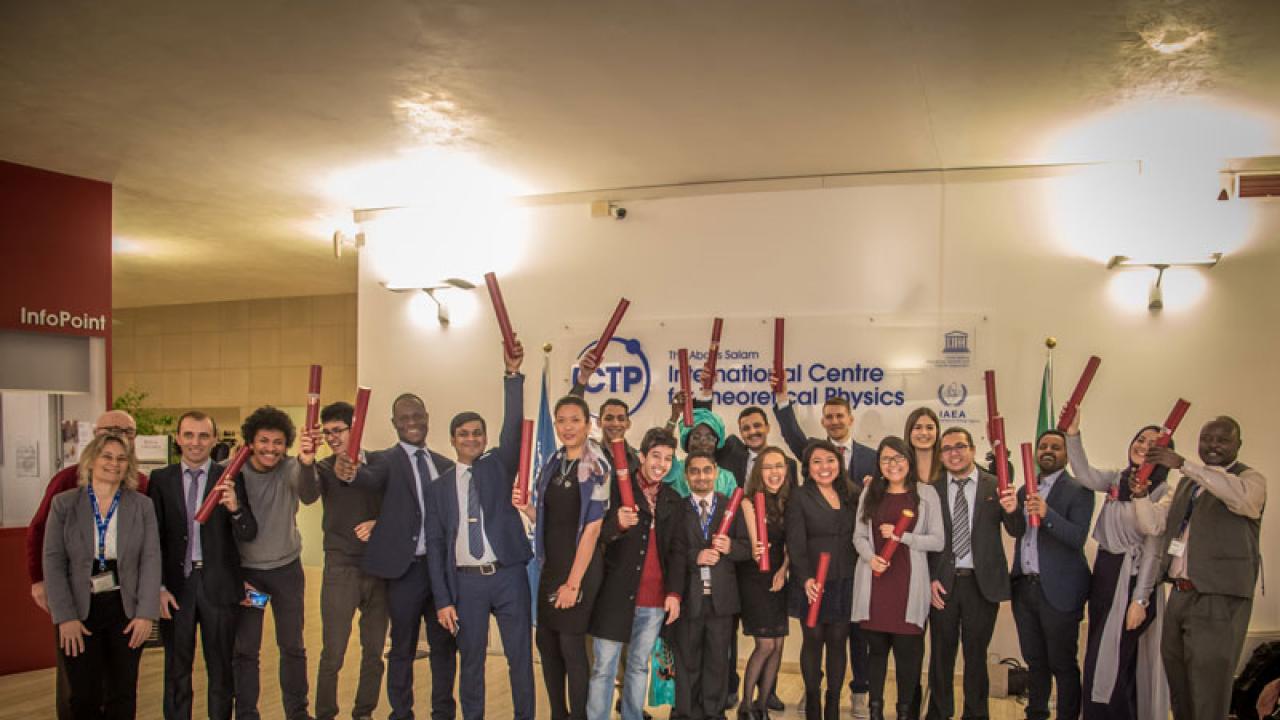
Thanks to its innovative master's degree programme in medical physics, ICTP is steadily supporting the improvement of the quality of health services in the developing world. Recently, the Centre celebrated the graduation of twenty students—the third class of medical physicists to complete the degree requirements—who will soon return home to spread new knowledge and expand professional networks.
ICTP's Masters of Advanced Studies in Medical Physics (MMP) programme is designed to provide young, promising graduates of physics or related fields with postgraduate academic and clinical training so that they can independently function as clinical medical physicists in their home countries. These new medical physicists will help expand care and therapy options in areas where medical physics knowledge can be scarce. With this third class, a total of 46 medical physicists from 30 countries have trained in the internationally rigorous MMP programme.
Medical physics expertise is a key part of health care, applied in all aspects of radiation medicine, from diagnostic imaging to radiation oncology. Cases of non-communicable diseases such as cardiac and neurological disorders and cancer are rising, but the resources needed to diagnose them are often scarce, including human resources. Using radiation effectively and safely in medicine requires skilled medical physicists in the clinical staff, however their training is difficult to get or non-existent in some countries. "I got to use technologies and equipment that I had only heard about before," says Fama Gning, an MMP graduate from Senegal. "It was amazing to be able to use them. It was like I was being included in science."
The dearth of training and equipment in developing countries is why ICTP and the University of Trieste partnered to prepare the MMP programme, with help from the International Atomic Energy Agency (IAEA), one of ICTP's UN sponsors. After completing a year of academic training in Trieste, the students spend a year in professional clinical training. Each Master's candidate completes and defends a dissertation in the last months of their clinical time. The clinical work, made possible with the help of medical physicists at many hospitals, is a key part of the programme. Ala 'Ahmad Amin Allouzi, a graduate from Jordan who did her clinical training in Ferrara, said of her experience, "Everyone there was incredibly supportive and welcoming. I would call my supervisor in Jordan to tell them about new techniques, and explain methods that we used at home to my supervisor in Ferrara. This constant exchange was one of the most important parts of the programme for me."
At the ceremony, ICTP Director Fernando Quevedo congratulated the graduates on their hard work. "Today is one of the days I really appreciate being the director of ICTP. It's great to see the success stories of each one of you." The Rector of the University of Trieste, Maurizio Fermeglia, was also there to commend the students: "The world is full of problems, and none of these will be solved by a single discipline; cross-disciplinary work is a must. Mixing medicine with physics—you are on the right track."
The graduation ceremony gave the opportunity for Director Quevedo to thank the organizations that support the Masters in Medical Physics programme, including the IAEA, the University of Trieste, the International Organization of Medical Physics (IOMP), the European Federation of Organisations for Medical Physics (EFOMP), and the Italian Association of Medical Physics (AIFM), along with eighteen clinical hospitals in Italy. Addressing the graduates, Harry Delis of IAEA's Human Health Division said, "The IAEA is working on developing capacity in human health. These medical physics graduates will ensure safe and effective treatment in their home countries, and spread their knowledge to future generations." The IAEA gives scientific and financial support to the MMP programme in the form of student fellowships and educational materials used in courses.
Most of the MMP students are supported by their government and employers as they do advanced training at ICTP. After graduating with both theoretical and clinical training, students typically return to their jobs, with new knowledge and skills to use and pass on to colleagues.
"The most valuable part of this whole programme is the network we build here, of experts and colleagues. We can ask questions with a lot of confidence, knowing that they're not only colleagues but often friends too," said Alejandro Arnulfo Coloma Espin, an MMP graduate from Ecuador. This international network is essential to collaboration and continued technical development, that the students can further extend to the network of medical physicists in their countries. "There are not many medical physicists in my country with this training," says Antony Kevin Reyes Ramos, a graduate from Honduras. "I'm one of the first ones, so I'll be helping to build a network there similar to what I've found here."
Christoph Henrich of the IAEA’s Technical Cooperation programme at the IAEA, agreed: "The international nature of the programme is a great thing—it broadens the horizons and opens the perspective. For the future, it enables the graduates to have a network, not only among themselves but with well-known medical physicists." The programme, he added, is a great way to reach larger goals: "Technical cooperation is largely about human resource capacity building, knowledge sharing, partnership building, and networking, and this programme, over the last three years, has shown that it's a very good example how to have a real impact."
Photos from the graduation ceremony are available on ICTP's Flickr account.
-- Kelsey Calhoun













